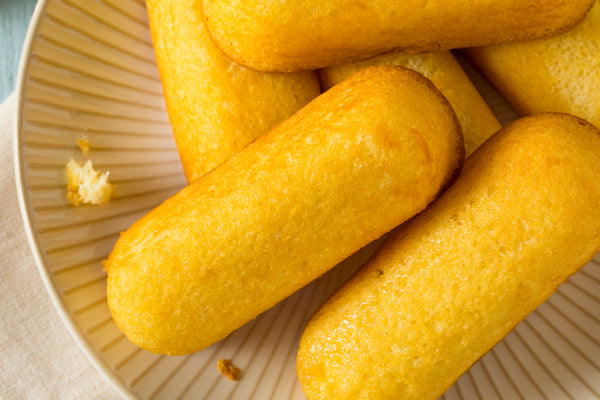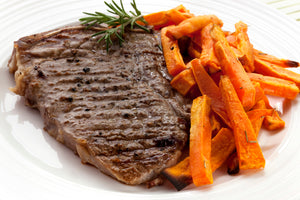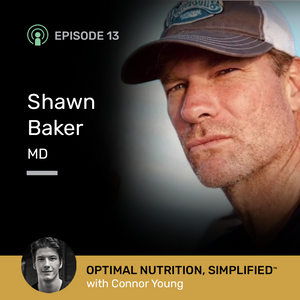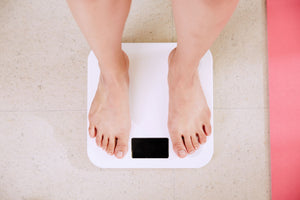Do Calories Matter? A Guide To Sustainable Weight Loss
By Connor Young on
You probably grew up hearing about the “calories in, calories out” model of nutrition. It’s been prevalent for the last hundred years or so, and it’s stuck around in part because it’s so enticingly simple: eat less than your body burns and you’ll lose weight. Eat excess food and you’ll gain weight.
Ultimately, this model is true. It’s basic physics, and it’s inescapable.
But calories are only a part of nutrition. There’s far more to eating well than the number of calories you consume – and furthermore, not all calories are created equal. So if you’re frustrated trying to lose weight (or you just dig nutrition), read on. We’re going to unpack why fueling your body and getting lean doesn’t just come down to calories. Let’s start by talking about how much calories really do matter, and why.
Calories DO matter…to a point
A calorie is a simple way to measure the amount of energy your body will produce from food. You figure out calories with a calorimeter, a machine that tracks how much heat (energy) food generates when you burn it inside the contraption. Throw a Twinkie in a calorimeter, burn it, and you’ll produce 135 units of heat. Thus, a Twinkie has 135 calories.

Bonus dietary advice: don’t eat these.
Scientists exploding Twinkies is a little abstract, so let’s bring calories back to your body.
All the food you eat and digest goes through your liver. Your liver is like a control center for regulating energy [1]. If your liver has more energy than it needs, it will send signals for your body to release insulin and store the excess calories as fat. It doesn’t matter whether the extra energy is from a kale salad or a cinnamon roll.
And, on the flip side, you will pull fat from your stores and burn them for energy as long as your liver sees a negative energy balance.
That’s why it’s totally possible to lose weight eating junk food, as long as you come in under calories. There’s the science teacher who dropped 61 pounds in 6 months eating nothing but McDonalds. There’s the Australian writer who lost 11 pounds in a month on a candy-and-whiskey diet.
Basically, nutritional quality of your diet aside:
- As long as you maintain a negative energy balance in your liver, you’ll burn body fat
- As long as you maintain a positive energy balance in your liver, you’ll store body fat.
But just because you can lose weight eating junk food doesn’t mean you should, and just because you’re lean doesn’t mean you’re healthy. So before you start eating sweets and drinking your way thin, let’s talk about why food quality matters just as much, if not more, than food quantity.
Hormones and thermogenesis: why not all calories are created equal
Not all calories are created equal. Three hundred calories of carrots will impact your body very differently than, say, 300 calories of cocaine (interestingly, most of those calories are from carbs). And while you could, in theory, maintain energy balance with ~2000 calories a day of cocaine, it probably wouldn’t be too sustainable.
It’s a ridiculous example, but it proves a point: what you eat impacts your body well beyond your food’s calorie content. Food affects hormones, metabolism, rate of fat loss, hunger, brain function, inflammation, organ health, blood flow – virtually everything.
Let’s scale back to a more applicable and reasonable comparison. We’ll unpack what happens when you drink 400 calories of soda, versus when you drink 400 calories of Ample. This example will illustrate two important aspects of metabolism and fat loss: hormones and thermogenesis.
Your body on a bottle of soda

Let’s say you drink a large glass of soda. It’s 400 calories, one hundred percent of which come from simple sugar.
Thermogenic effects
The more you have to work to digest and distribute energy from food, the more calories you burn processing it. As a rule of thumb, foods that are harder to digest increase your metabolism. This is a process called thermogenesis.
Sugar requires almost no digestion because it’s already refined into basic units of energy. In other words, sugar is not very thermogenic. Eating it doesn’t drive you to burn more calories – you process it quickly and without effort.
Hormonal effects
Hormones are a huge player in metabolism and health. They regulate essential body processes like hunger, fat storage, mood, and energy.
The sugar in soda affects a handful of different hormones:
- Insulin. Lots of sugar at once spikes your blood glucose to exceptional levels. You feel great and have lots of energy – the start of a sugar high. But high blood sugar is dangerous, so your body sends in the hormone insulin to clean it up. Insulin pulls sugar from your blood and stores it as body fat. In small doses, this isn’t a problem. But in response to such a high spike in blood sugar, your body will often release extra insulin, to clear the sugar as quickly as possible. The insulin ends up pulling more sugar from your blood than you want it to.
- Ghrelin. When insulin pulls excess sugar from your blood, the sugar high turns into a crash – the low blood sugar makes you feel exhausted, and signals that you don’t have enough energy. Your body responds to low blood sugar by releasing ghrelin, another hormone. Ghrelin suppresses the extra insulin release… but ghrelin also makes you hungry (in fact, it’s nicknamed “the hunger hormone”) [2]. Now you’ve stored sugar as body fat and you’re exhausted and starving, so you start eating again. This probably sounds familiar if you’ve ever gone on the rollercoaster of a sugar high and crash.
- Testosterone. Testosterone isn’t only a man thing. It’s just as important for women, and for both sexes it does a lot more than boost sex drive. Testosterone regulates all kinds of essential processes in your body, including mood, muscle preservation, and fat metabolism. And sugar has a pretty strong impact on your testosterone. A 2013 study found that drinking a sugary beverage dropped men’s testosterone levels by 25% within an hour, and it was still depressed two hours later, when the study concluded [3]. Low testosterone links to fat gain, decreased metabolism, muscle loss, and diabetes [4,5].
As you can see, drinking a soda has far-reaching effects that go beyond its calories. From a weight loss perspective (or even just a stable mood/energy perspective), it’s easy to see how a high-sugar diet could make it very difficult to stay on course when you’re dealing with the rollercoaster of blood sugar balance.
Now let’s look at a 400-calorie Ample.
Your body on a bottle of Ample

Ample is also 400 calories, but it has a balance of protein, fat, and fiber that has a very different effect on your body:
Thermogenic effects
- Protein is the most thermogenic macronutrient [6]. The complicated structure of protein takes the body a lot of effort to digest. You spend energy (calories) breaking it down, which could help explain why eating plenty of protein leads to weight loss and improved muscle composition compared to calorie-identical diets with less protein [7]. This is partly why we made Ample higher in protein.
- Medium-chain triglycerides (MCTs) are a particularly thermogenic class of fat [8] that makes up about 15% of coconut oil. Ample has a meaningful amount of coconut oil, partly for this reason.
A balanced mix of quality protein, fat, and carbs led people to burn 5-15% more energy daily, without changing the total calories they ate [9]. That alone will play a big role in keeping you slim over time.
Hormonal Effects
- Insulin stays stable with Ample because most of the energy comes from fat, which doesn’t affect blood sugar. Ample does have some carbs, but most of them are complex carbs from sweet potato, meaning they take time to break down and won’t spike insulin the way sugar does [10]. Ample also has lots of fiber, which regulates blood glucose and insulin levels [11]. No insulin spike means no energy crash, and less fat storage, provided you don’t overeat.
- Ghrelin is the hunger hormone you read about in the last section. You release it when you have low blood sugar or your stomach/GI tract is empty, to tell your brain to send hunger signals and get you eating again. Fiber is very good at curbing hunger (even though it has no calories) because it keeps your GI system full for a long time, which suppresses ghrelin and keeps you satisfied for several hours [12,13].
- Cholecystokinin (CCK) is a hormone that makes you feel full – so much so that hungry monkeys injected with CCK will stop eating mid-meal [14]. Your intestinal cells send CCK up to your brain to tell it when you’re satisfied and have plenty of energy. Protein [15] and fat [16] trigger strong CCK release, which is partly why high-fat and high-protein meals tend to be so satisfying. A high-fiber meal also triggers twice as much CCK release as a low-fiber meal does [17]. Ample is high in protein, fat, and fiber – we designed it to be as satisfying as possible.
The combination of real-food ingredients in Ample should leave you with stable energy and satiation for several hours, despite being only 400 calories (or 600, if you go for the bigger bottle).
Final thoughts
Nutrition is more nuanced than “calories in, calories out.” The quality of what you eat has a major effect on your body and health. If you’re trying to lose weight, simply cutting calories without changing the quality of your food can be a recipe for frustration. White-knuckling through hunger day in and day out is an unpleasant – and more importantly, unsustainable – way to eat.
Instead, shift your nutrition toward higher quality food. There’s a strong chance you’ll find that eating a diet full of quality protein, fibrous veggies, healthy fats, and complex carbs leaves you more satisfied, and you’ll naturally eat fewer calories. That’s not to say you should ignore them entirely. Keep them in mind, and play with the ratios of fat, protein, and carbs until you find a balance that keeps you full and energized without overeating.
And don’t worry if you have to try a few different combinations! Building a strong foundation of health is a lifelong process. We can help:
- We have a guide to healthy fats, complete with food recommendations and a meal plan.
- Our simple guide to fasting shows you how to change your meal timing to increase fat loss and performance.
- We also unpack what makes meals satisfying in more depth and look at studies on sustainable, gradual fat loss.
- And our thoughts on practical nutrition may help if you feel like you’re stressing too much over food and diet (no judgment – we’ve been there and we totally get it).
Any questions or comments? We look forward to discussing them below. Thanks for reading.
The post Do Calories Matter? A Guide To Sustainable Weight Loss appeared first on Ample.
← Older Post Newer Post →





